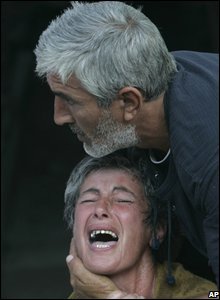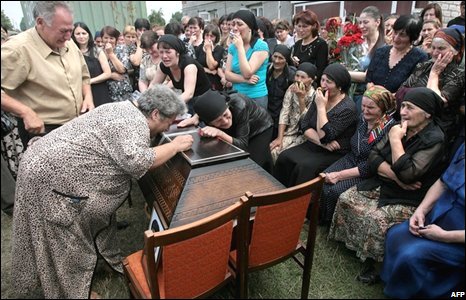Another war in the silly season.

 As always with the fog of war, it's next to impossible to know accurately at any stage what genuinely is happening in Georgia/South Ossetia/Abkhazia unless you're on the ground. To a degree, however, we're now fairly certain of what started it. Although there have been months of provocation on both sides, while Putin was away in Beijing attending the Olympics, the Georgian president Mikheil Saakashvili seemingly gave the order for a large assault, if not for the whole of South Ossetia then most certainly for its capital, Tskhinvali. Survivors of the attack, streaming to the Russian border for safety, describe carnage and snipers shooting at them as they fled. The Russians have claimed that up to 2,000 people were killed, although they've also hyperbolically described it as a genocide. How much of Tskhinvali has been destroyed or damaged is unclear, as the Russians have yet to let any journalists into the capital.
As always with the fog of war, it's next to impossible to know accurately at any stage what genuinely is happening in Georgia/South Ossetia/Abkhazia unless you're on the ground. To a degree, however, we're now fairly certain of what started it. Although there have been months of provocation on both sides, while Putin was away in Beijing attending the Olympics, the Georgian president Mikheil Saakashvili seemingly gave the order for a large assault, if not for the whole of South Ossetia then most certainly for its capital, Tskhinvali. Survivors of the attack, streaming to the Russian border for safety, describe carnage and snipers shooting at them as they fled. The Russians have claimed that up to 2,000 people were killed, although they've also hyperbolically described it as a genocide. How much of Tskhinvali has been destroyed or damaged is unclear, as the Russians have yet to let any journalists into the capital.If Saakashvili was hoping that the assault would go unnoticed, overshadowed by the opening ceremony, or alternatively with Putin away that the Russians would be slow to respond, neither occurred. Within hours the Russian counter-assault was launched, with such apparent planning that they have since been accused of planning the wholesale invasion and subjugation of Georgia. Yesterday the Georgians pulled back from South Ossetia entirely, and according to Saakashvili are now under a unilateral ceasefire. Not clear at the moment is just where the Russians are, what their intentions are, and whether returning to the status quo is possible, let alone desirable. Reports throughout the day have claimed that the Russians have cleaved the country in two, have taken Gori, 47 miles from Tbilisi and a town subjected to bombing raids, and have also taken Senaki, 25 miles from the Abkhazia boundary. All have been denied and counter-claimed or clarified, with no real confirmation to make the reality clearer.
Atrocities have undoubtedly been committed by both sides. Craig Murray calls Georgia's actions lawful, but by the survivor accounts we have heard they were certainly being completely indiscriminate in both shelling and sniping. Russia's response has also clearly gone beyond the realms of defending citizens that both they and it regard as subjectively their own; the raids on Gori, attacks on Tbilisi airport and the targeting of economic as well as military installations further confirms this. As Craig also states, what is desperately needed is an immediate ceasefire from both sides so that the dust can settle, for the true picture of what has happened to emerge, and so that those now travelling to the region to engage in urgent diplomacy do not have their trips completely wasted.
You can however hardly blame Russia's initial response to what was a naive, foolhardy and apparently murderous gambit by Saakashvili. As korova notes, back at the end of last year Saakashvili's approval ratings were hovering around the 16% mark. For all the talk of Georgia and its wonderful emerging liberal democracy, Saakashvili has presided over, like in Russia itself and China, a virulent rising of nationalism, promising in effect that both South Ossetia and Abkhazia would remain a part of Georgia, and even potentially be re-taken. If last Thursday/Friday's events were him putting his plans into effect, then it has backfired in a way that he must have surely at least contemplated it might. For all the overwhelming support that Saakashvili is now receiving from the West, they must privately be fuming that such an apparently suicidal mission was even contemplated, let alone attempted, although it would be hugely surprising if America or intelligence agencies didn't have even an inkling of what was shortly going to happen. It will almost certainly kill Georgia's chances of joining NATO for years, if not decades, and the West's desire to encircle Russia through the alliance, for that is undoubtedly what it is, cannot yet be realised.
There is of course a hypocrisy an inch thick running through the entire debacle. It's impossible not to be reminded of events two years previous when Hizbullah's attack and kidnapping of Israeli troops sparked the near month long war which resulted in the deaths of around 1,200 Lebanese civilians and nearly 200 Israelis. Then the boot was on the other foot: Israel's missile attacks on Beirut airport, on power stations and on the residential sections of Beirut where Hizbullah had its base were by no means disproportionate, words that no one in government in this country or in the Bush administration uttered, even when Qana was hit for a second time. Bush has just described Russia's actions as "unacceptable in the 21st century", even though Israel too invaded and attacked a sovereign, democratic state in just as vicious a fashion. Our own actions in Iraq leave us with next to no legs to stand on when lecturing other nations for invading sovereign states, yet we continue to act as though we are paragons of the international scene. We refer to Russia as though nothing has changed since the days of the cold war, as though we are the perennial abused and victimised, and yet still America insists on installing missile interception systems in Poland and the Czech Republic which it pretends are aimed at Iran but which are quite transparently really meant to protect against attack from Moscow, encircling it slowly but surely. We then wonder why the Russian bear, to go with the cliché, then dares to on occasion show its fangs.
There are, to repeat, no good guys here. Russia, as if it needed to be mentioned, is hardly acquiescent when it comes to regions which want to break away from it, such as Chechnya, subjected to horrific conflict throughout the 90s and into the 00s, with the destruction which Grozny suffered an reminder of what Georgia might yet be in store for. Georgia however, and its desire to be seen as the victim, are equally as false and facile. What must urgently be rejected is the tendency to see this either as a resurrection of the cold war or as a great opportunity for the old Russiaphobia to once again take hold, something which CiF seems to be trying to achieve. All of the historical precedents which have been sited, whether they be 1938, 1956 or 1968, are not yet applicable, nor does it seem they will become so. It also undoubtedly punctures another hole in the fatuous idea of Thomas Friedman's that countries that have McDonald's don't go to war with each other. The key now is ensuring that this war is ended before any McDonald's themselves are destroyed.
Labels: Abkhazia, foreign policy, Georgia, hypocrisy, Mikheil Saakashvili, Russia, Russia-Georgia war, South Ossetia, Vladimir Putin
A thorough and perceptive analysis as usual. The prescription ("The key now is ensuring that this war is ended before any McDonald's themselves are destroyed.") less so. just who do you suppose might be available to do the ensuring?
Another point: nobody seems to be asking a rather obvious question 'How could Saakashvili have undertaken the whole thing - the planning, movement and timing logistics etc - without the knowledge - and therefore at least a nod-and-wink - from the US?'
If he did get that nod-and-wink - with the Russian response so predictable to anyone with half a brain ..... Well, think about it
Posted by Sabretache |
Tuesday, August 12, 2008 7:52:00 am
Sabretache |
Tuesday, August 12, 2008 7:52:00 am
One of the best blogs about the events in the Georgian region.
Posted by ian |
Tuesday, August 12, 2008 8:18:00 am
ian |
Tuesday, August 12, 2008 8:18:00 am
I share the others admiration for the general thrust of this but as I pointed out over at LC the hypocrisy charge is overdone.
Israel was subject to rocket and ground attacks and had two soldiers kidnapped from their own territory. Georgia's behaviour has been far from exemplorary but by no stretch was Russia provoked to that degree so the parallel between the Russian response and the Israeli one is very weak.
And that's before you take account of context & history which is again wildly different - to my knowledge Russia doesn't have a 60 year history of it's neighbours denying it's right to exist and attacking it at various intervals. In fact, now that I think about it isn't that the other way round...!
For the reasons you point out the 'plucky minnow' tag attached to Georgia is a bit misplaced and as you say 'there are no good guys here'. That doesn't excuse a lazy and slightly ill-informed swipe at Israel though....
Posted by Liam Murray |
Tuesday, August 12, 2008 11:44:00 am
Liam Murray |
Tuesday, August 12, 2008 11:44:00 am
Have you seen today's 'Sun Says'?
http://www.thesun.co.uk/sol/homepage/news/sun_says/article244723.ece
The third sentence is a bit rich coming from a 'newspaper' which always supported the invasion of Iraq.
Posted by Sabreman64 |
Tuesday, August 12, 2008 1:31:00 pm
Sabreman64 |
Tuesday, August 12, 2008 1:31:00 pm
Cassilis: I disagree, as you might well expect. By all accounts, the provocation by Georgia far far exceeds the actions of Hizbullah, and the history of the region by no means mitigates the assault on Lebanon as a whole which followed.
Posted by septicisle |
Tuesday, August 12, 2008 2:37:00 pm
septicisle |
Tuesday, August 12, 2008 2:37:00 pm
It's unfortunate that I have to end up sounding like Galloway, but the Hizbollah/Lebanon/Israel problem didn't begin with the abduction of Israeli soldiers.
Posted by thabet |
Tuesday, August 12, 2008 2:48:00 pm
thabet |
Tuesday, August 12, 2008 2:48:00 pm
Strange. That link I gave yesterday to that 'Sun Says' has changed. Here's the new link:
http://www.thesun.co.uk/sol/homepage/news/sun_says/article1551069.ece
Posted by Sabreman64 |
Wednesday, August 13, 2008 12:29:00 pm
Sabreman64 |
Wednesday, August 13, 2008 12:29:00 pm
Post a Comment